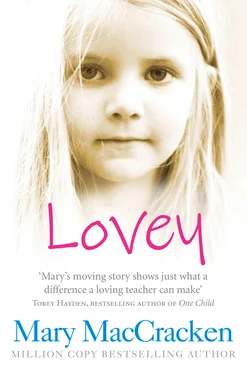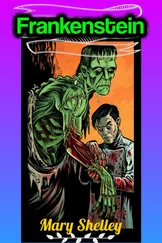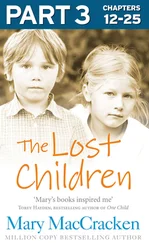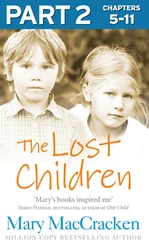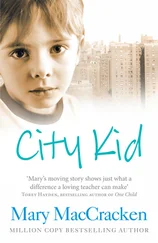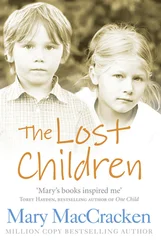The folder contained a school form filled out by Mrs Rosnic, a health form from the paediatrician, a report from the principal of the public school Hannah had attended; there were also a joint report by a psychologist and a social worker at a mental health clinic, a final report by another psychologist from the public school, and a half-page year-end report written by Hannah’s teacher from last year. From these I gradually pieced together Hannah’s history.
She had been born eight years earlier in a hospital in New York City. Her life had been filled with violence from the beginning. She had cried constantly through her first days and nights, eating little at first, finally refusing to eat at all. In desperation, Mrs Rosnic took her back to the hospital where she had been born. They discovered an abdominal obstruction which had caused food blockage and dehydration. Hannah was operated on and hospitalised for several weeks.
When she returned home she was able to eat and some of the screaming stopped, but she rocked back and forth in her crib, banging her head against the end panel.
Her brother, Carl, three years older, was resentful of the new baby. One day soon after Hannah came home from the hospital, Mrs Rosnic found Carl by Hannah’s crib, hitting her on the head again and again. In spite of everything, she grew; she walked at thirteen months and completed toilet training at age two. However, Mrs Rosnic continued to bottle-feed her until she was three years old, and although no connection was made, it seemed pertinent to me that Hannah didn’t try to talk until then. Her speech consisted primarily of grunts and monosyllables that only Mrs Rosnic could understand.
When Hannah was four, her family moved to the run-down industrial city where she still lived. They occupied a two-family house in a derelict section of town. Mrs Rosnic’s father lived downstairs; the Rosnics themselves occupied the second floor.
Hannah’s father had been a strange, brutal man. He must have been tortured by both emotional and physical ailments. The records showed that he had been in and out of mental institutions over the years, yelling, shouting, beating his children when he was home. Later he was confined to a wheelchair, from which he berated the world and everyone in it. He died in the same bizarre manner in which he had lived. Rising suddenly up out of his wheelchair at his mother’s funeral, he was stricken with a heart attack and died the next day, two years before Hannah came to our school.
At the time of her husband’s death, Mrs Rosnic was pregnant with a third child. Still in her early thirties, a widow with little money and no training, with an ailing, demanding father, two young children, and another child soon to be born, she became ill herself, overcome by a deep depression.
She turned to her church for help; they put her in touch with a community mental health centre. Here she was interviewed jointly by a psychiatric social worker and a psychologist, who judged her to be of ‘bright normal intellect with a fair insight and judgement, but with a feeling of being unable to cope’.
I got up from the table and began to pace as I read. Who wouldn’t feel ‘unable to cope’ under similar conditions? The report ambled on, bleak and without compassion. Carl, Hannah’s brother, was summarised and dismissed in two brief sentences as having ‘a childhood adjustment problem with the unusual phobia of fearing the key to an old clock’. Hannah was described as ‘a seven-year-old Caucasian female –’
I put the report down, hating the stilted language. Who could write that? And why? Was it to impress some invisible audience or was it simply the way psychologists had been taught to write reports? Hannah was a sad, solid, gutsy little girl with blue eyes and red-gold hair. How could they write ‘seven-year-old Caucasian female’? Why did people deal out labels instead of looking at a child? Never mind. Forget the anger. It didn’t help now.
‘– Caucasian female exhibiting restless behaviour, with unintelligible speech consisting primarily of grunting noises. Judgement and insight extremely poor. Diagnosis: Psychosis. Organic brain disease versus schizophrenia.’
It seemed to me a dangerous, presumptuous diagnosis after one brief interview. I searched the remaining pages for more concrete information. An electroencephalogram had been made, and since it was within normal limits Hannah was put in a kindergarten class on a trial basis – but this lasted only a short time. Soon she was put on home instruction because of her ‘disruptive behaviour’. The dates in the reports were confusing, but it must have been a hard, bleak period for Mrs Rosnic, for the whole family.
I shook my head. No wonder the teachers in our school rarely complained. Our troubles, whatever they were, were small compared to the lives of our children and their families.
The late-afternoon sky was dark and the air was filled with the musty smell of rain. At least it would be cooler tomorrow. Tomorrow? Tomorrow would be here very soon and I still had a great deal to do before morning. I turned on the overhead light and skimmed the remaining pages.
Mrs Rosnic’s pregnancy had gone full term and Hannah had been born, a healthy eight-pound girl. Hannah had remained on home instruction until a place was found for her here; then one last psychological work-up was done in the public school. It said that Hannah – an aggressive child with a deep underlying pathology – seemed to be living completely in a world of her own. ‘This child must be regarded as a threat to other children.’
Lightning streaked across the sky. No one else was left at school and I knew I should hurry.
How could a child ever grow in a place where she was looked upon as a threat? There was only one positive note in the report: The psychologist noted that Hannah’s drawings showed ‘an above-average mentality’.
Well, maybe this was how I’d have to reach her, through her mind, her intelligence. But how could I get through? She’d fought so many enemies already in her eight years, seen more pain and cruelty than most of us do in a lifetime. Her mind must be sealed behind many layers – she would have needed to build thick walls in order to survive as long as she had.
Outside, the rain pelted hard against the black macadam. I closed my windows and read the last remaining page. The report from Hannah’s teacher of last year described Hannah as a troubled, sad little girl, unable or unwilling to use eating utensils, given to long crying spells and temper tantrums, her speech a garble of unintelligible slurred consonants – and yet her actions showed an acute awareness of her environment. She had remained difficult and disruptive throughout the year, but there had been some improvement and rapport gradually developed between teacher and child.
It must have been a cruel blow for Hannah to come back this morning and find her teacher gone, the first semblance of security disrupted. Whatever tiny hope had stayed alive inside her must have crashed into despair.
I put the report on the top shelf of my closet and left by my own door. I stood on the step just outside and watched the small rivers of rain swirl past; then I took off my shoes and raced up the driveway to the car park in my bare feet. But when I reached my car, I stood still for a minute before getting in. My dress and hair were already soaked and the rain felt cool and clean against my face and arms. I wished that it would cool my head and heart as well. Hannah would bring enough passion into our room. She would need a teacher who was clear and steady and strong.
What I needed to do, had to do as soon as possible, was set up an appointment with Mrs Rosnic so that we could talk. There were so many complicated factors in Hannah’s history: the operation, the isolation of the hospital, the head blows, the brutal father, the prolonged bottle feeding. I was as confused as when I started.
Читать дальше
